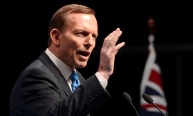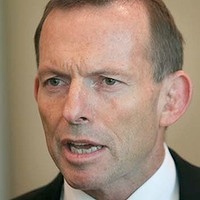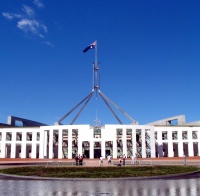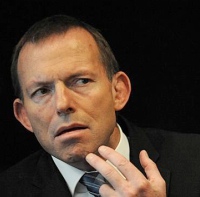- About Us
- Columns
- Letters
- Cartoons
- The Udder Limits
- Archives
- Ezy Reading Archive
- 2024 Cud Archives
- 2023 Cud Archives
- 2022 Cud Archives
- 2021 Cud Archives
- 2020 Cud Archives
- 2015-2019
- 2010-2014
- 2004-2009
 |
(Aug 2015) Plebiscite, Tony? ‘Nope. Nope. Nope’. * |
It would make a pleasant change to be able to say something positive about the Australian Government. It is not just that many of the Coalition’s policies, which rely so heavily on the Prime Minister’s preferences, are repugnant. It is also because a government’s approach can introduce subtle changes to political culture and so to Australian ethics. Critics of Prime Minister Howard, who led a previous Coalition (Liberal and National Parties) government 1996-2007 accused him of lacking leadership, but too often they failed to see that he was leading but in directions which they found distasteful. Howard stated clearly that he wanted to make Australia ‘the world’s biggest shareholding democracy’. Whether you agreed that this was a good idea, or even if you believed the term was not oxymoronic, the Howard years saw Australians engage much more with the share market. The worry about this trend is that in such a relationship, people are driven entirely by self interest. Concern for others is not encouraged. Anyone who has attended a shareholders’ meeting must have serious concerns about the accountability of company boards and executives. There are worrying signs that the main cultural legacy of the Tony Abbott prime ministership (2013- ) will be even less palatable.
‘Democracy’ is a hotly debated topic, but by most definitions, a democratic state is likely to include responsible government and human rights. The Coalition Government has been having great difficulty in understanding that it is creating unfortunate precedents in both areas. Its enthusiasm for contracting out the administration of asylum-seeker detention centres breaks the line of accountability between the staff running the centres and the minister supposedly responsible. It has been difficult for parliamentary committees to access information in a timely manner.
The Government has also made it a crime for teachers and medical personnel to report problems such as child abuse – something mandatory across Australia. It denigrated the Human Rights Commissioner when she released a Report on Children in Detention. The Prime Minister claimed just days earlier when he survived a leadership challenge that he was going to start listening. Clearly the listening was to be selective. Critics such as the HRC and the United Nations would still be ignored. In the case of the HRC President, the Prime Minister turned his denigration into a nasty personal attack on her professionalism. Such attacks by male ministers on female critics have been common –the Immigration Minister against Greens Senator Hanson-Young for example - and may well undermine government campaigns to eradicate domestic violence.
When a court order stopped a mine going ahead because it was illegal, the Attorney-General accused environmentalists of ‘waging greenfare’ against Australia. He threatened to legislate to prevent people not directly affected by decisions from using the courts. The Government had already curtailed the rights of asylum seekers to access Australian justice. Surely, we are all affected by coal mining. It is interesting that the Government has made it easier for people to object to wind power installations. In the broader context, this threat to limit public access to courts shows that the Government does not believe executive power should be held in check by the judiciary.
Another manipulation of the political process has arisen in the Prime Minister’s response to demands for marriage legislation reform. Knowing that there was widespread public support for amending the law to remove the narrow definition of marriage as between a man and a woman, the Prime Minister resorted to familiar tactics. He argues that it is inappropriate for politicians to decide the question but that the people as a whole should decide. This is a bizarre proposition. Governments are elected to govern and this means firstly that they pass and amend laws within parliament. If Mr Abbott’s idea were extended to all policies, then we could do away with parliament and government and rule ourselves by endless plebiscites.

The Prime Minister obviously aims to manipulate the process as he did with the 1999 referendum on a republic. Then Prime Minister Howard was visibly happy when the Constitutional Convention held to compose the referendum question decided that the first step on the road to a republic should be the choice of an Australian Head of State by parliamentarians. Abbott, like Howard a monarchist, went into overdrive telling people not to trust politicians. He might have been generalising from his own attitudes and experience because he later admitted that he routinely lied when asked questions.
There are hopes that a referendum on including Indigenous people in the Constitution will be held in 2017 – 50 years after another successful referendum on Indigenous people. Astute observers fear that the referendum question could be manipulated to suit the Prime Minister’s preferences. Prominent Indigenous leaders recently called for a series of conventions to be held among Indigenous people, but the Prime Minister initially refused. He then changed his mind and said that there would be such meetings, while denying that there had been any turnaround in his stance.
When Liberal backbencher Warren Entsch decided to introduce a private members bill to amend legislation so that it no longer required that marriage be between a man and a woman, the Prime Minister manipulated the party processes to get his way. Leading Liberals wanted the party to ‘allow’ a conscience vote on the bill. It is a curious understanding of the idea of a conscience vote to imagine that it has to be authorised, but the Prime Minister opposed a conscience vote anyway. He knew that generally conservative National Party members of the Coalition would oppose anything which helped the Entsch bill pass. So, instead of calling a Liberal Party meeting to discuss the conscience vote, he called a Coalition meeting. The Education Minister called this approach a ‘branch stack’. But surely, even Cabinet Ministers could resign and go to the backbench if they needed to satisfy their consciences and support the bill.
The idea of consulting ‘the people’ on the issue of making marriage legislation non-discriminatory seems quite bizarre. I don’t own the definition. In fact I find it repugnant that any person should claim the power to tell people who they may marry. This happened in South Africa under apartheid and it had a direct line of descent from Nazism. It is significant that voices for change in Australia have been moderate and patient, while those opposing change have been strident and unreasonable. The Prime Minister’s manipulative tactics on this issue could be no encouraging homophobia.
Whether Abbott’s bizarre sense of his Catholicism has anything to do with his determination on the marriage issue is unclear. Certainly the resort to a plebiscite is yet another ‘Captain’s Pick’, like honours for the Queen’s consort, choice of a Speaker who recently resigned in disgrace and of a Royal Commissioner with Liberal Party sympathies - and imminent closer engagement with US forces in the Middle East.
What seems certain is that trust in the political system, trust in the processes of government and trust in the overall fair-mindedness of Australians are reaching all time lows. They are being dragged down by a Government which will be remembered chiefly for ‘backflips’ on policy, lack of consultation and use of weasel words to justify its actions. Sydney Morning Herald cartoonist Alan Moir recently depicted the likely alternative Liberal Leader Malcom Turnbull waiting patiently, unflustered with a clock going ‘Tick, tock’ while Prime Minister Abbott blunders around trying to crash through. How much longer Liberal backbenchers will give Mr Abbott to make them feel confident about the next election is anyone’s guess. At present Abbott seems unelectable, but many of us thought that prior to the 2013 campaign. Mr Turnbull is republican, supports marriage legislation reform, is courteous and rational. If he leads the Liberals to the next election against a lack-lustre Labor Opposition, the collective sigh of relief – and not just from Liberal voters - could blow the party across the line with ease.
*PM Abbott’s reply when asked whether Australia would be taking more refugees as a result of a growing regional crisis.
A former academic, Tony Smith has written extensively on a wide range of subjects as diverse as folk music and foreign policy issues in the Australian Review of Public Affairs, the Journal of Australian Studies Review of Books, Overland, the Australian Quarterly, Eureka Street, Online Opinion and Unleashed.
